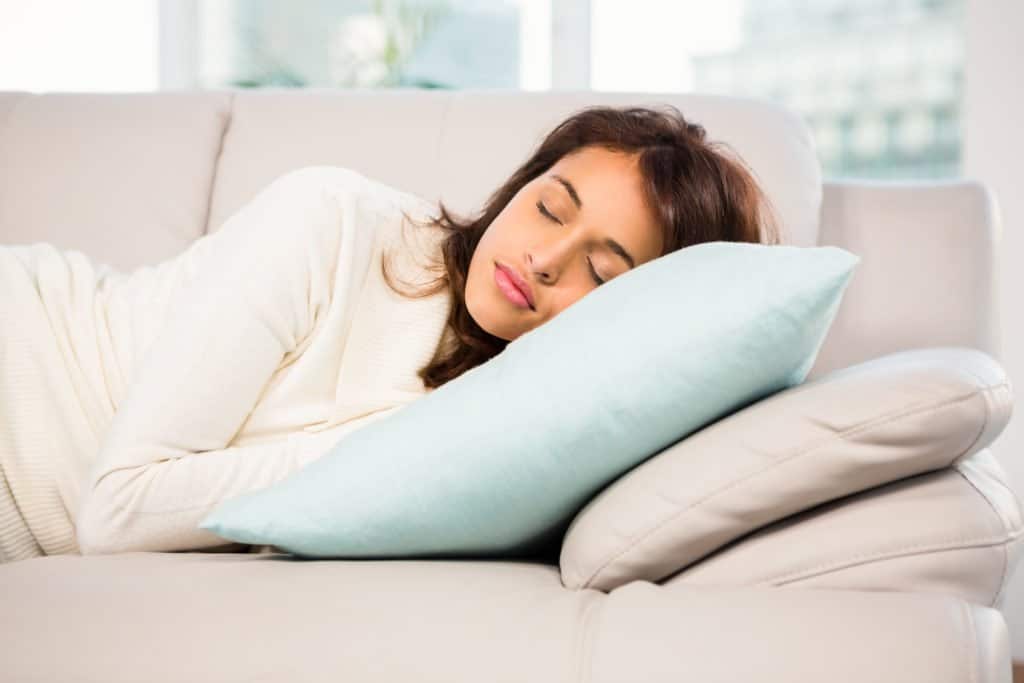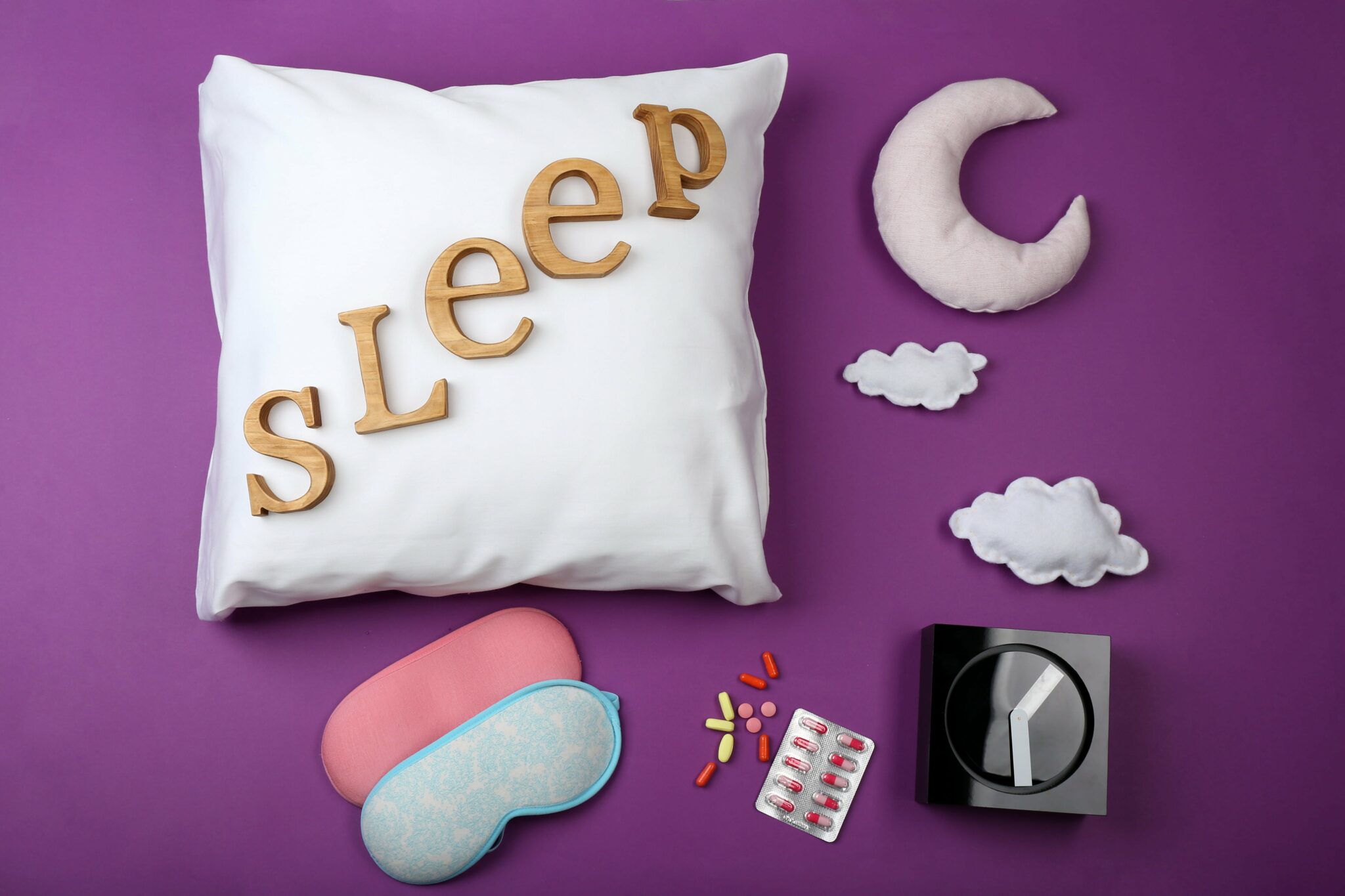When you go to lie down at night, your routine may consist of tossing, turning, and hoping you can get any sleep at all. Not being able to fall asleep when you know you need it is extremely frustrating, and thinking about not sleeping only makes it worse.
There are classic ways to combat this, like tracking your sleep or turning off your phone. But what happens when those don’t do the trick? In order to turn your restless nights into sweet dreams, here are some simple ways you can try to sleep better tonight.
If you feel like you’re having trouble sleeping, take our insomnia test.
The Easiest Sleepy Tricks
Develop a Consistent Sleep Schedule
This is easier said than done, but it’s extremely possible and beneficial! One of the best ways to get your body to continually fall asleep quicker? Go to bed and wake up at the same time every day.
A great tip to maintain a consistent sleep schedule is to set a reminder on your phone an hour before you plan to sleep. That way, you can begin your nightly routine and be ready to rest in no time.
Power Down Completely
Believe it or not, there was a time before smartphones and Netflix existed and were able to keep us up at night. In order to fall asleep faster, channel that old spirit and power down all your electronics— and I mean all of them. Whether it’s your television, laptop, tablet, smartphone, or even your lamp, power everything down to achieve complete and total darkness.
There’s a good reason for this tip, as our bodies require darkness in the evenings. Why? To aid in the release of melatonin, a hormone that determines the healthy timing of our sleep.
What do our electronic devices have to do with melatonin? Well, they emit blue lights, fooling the brain into thinking it’s still day time. When this happens, your body may delay releasing melatonin. This can make it quite difficult to fall asleep faster. So, shut down all electronics about an hour before you go to bed. You’ll turn your bedroom into a sleeping sanctuary!
Put Your Anxieties to Rest

Often, a large contributor to tossing and turning is anxiety. Whether you’re worrying about what happened that day or what’s to come, the stress can cause your mind to run aimlessly.
To combat this issue, try writing out your worries. Lay your anxieties to rest by putting them down on paper. Compile a list of things that you need to accomplish tomorrow so that you can forget about them tonight.
You could even incorporate this into a larger sleep journaling practice where you record your hours sleep each night in a bullet journal. The goal then becomes finding recurring themes in the nights with fewer hours sleep and working on those issues.
Plus, sleeping with your dog or cat can make for an anxiety-free rest as well. Their have been countless studies that have shown sleeping with pets lead to a decrease in feelings of depression and anxiety, making them a worthy partner to snuggle up to.
Chill Out— Literally
When our bodies experience a drop in temperature, our melatonin levels are affected and we fall asleep quicker. Reducing your core temperature is a crucial part of fast tracking your way to hitting the hay. According to the National Sleep Foundation, the suggested bedroom temperature should be between 60 and 67 degrees Fahrenheit for optimal sleep.
To help your body process this change, it might be a good idea to soak in a hot bath for around two hours before bedtime. This process may amplify the change in temperature. Once you step out of the bath, your dilated blood vessels begin to radiate out inner heat, and your core body temperature begins to drop.
Avoid Clock-Watching
No matter how hard it may be, do not look at your clock. It doesn’t matter if you look at the clock in the middle of the night or while you’re trying to sleep. The bottom line is that having a clock in your room is more hurtful than helpful. If possible, remove the clock completely from your room to avoid watching it. You might not expect it, but this move will increase your chances of falling asleep faster by a landslide.
Avoid Naps During the Day

We all love a good nap. Whether you come home from a busy day at work or you’re tired from poor sleep from the night before, a simple nap does just the trick. But when it comes to falling asleep faster, it’s important to avoid naps like the plague if you find they keep you up at night.
While there are mixed opinions about the effects of napping on nighttime sleep, it’s crucial to find out if naps are affecting your sleep. To do so, try either eliminating naps altogether or limiting yourself to a short nap early in the day. See how you feel and make a judgment call from there.
Limit Caffeine Consumption
From the moment you wake up in the morning, a chemical called adenosine builds up in your brain to make you feel sleepier the longer you stay awake. Caffeine intake can block the adenosine, causing you to get a jolt of energy… only to result in a caffeine crash later. Just like any bad habit, the caffeine will have you craving more to boost your energy, resulting in a never-ending cycle.
To prevent caffeine affecting the time it takes for you to fall asleep, avoid caffeine after 2 p.m. The average half-life of caffeine is five to seven hours, making it crucial that you implement this rule if you want to fall asleep faster.
Don’t Do Anything in Bed That Isn’t Sleep
If you have a habit of doing work, homework, or anything non-sleep related in bed, you might want to consider stopping. If you continually do things in bed that don’t involve sleeping, your brain may begin to associate that space with those stressful activities. That makes it increasingly hard to unwind at night. By making your bed a technology and work-free zone, you can work to get the sleep you need in a faster way.
The Four-Seven-Eight Method
There’s a sleeping technique that’s known as “relaxing breath.” It involves breathing in for 4 seconds, holding the breath for 7 seconds, then exhaling for 8 seconds. This breathing pattern helps reduce anxiety and guide you to sleep. If at any point experience lightheadedness, stop using the technique. Or, modify the length of your breaths to best suit your needs.
Seek Medical Help

If you make meaningful lifestyle changes to help you achieve the sleep you crave and still don’t get results, seeing a doctor may be a good idea. A physician may be able to see if you have a sleeping disorder that needs addressing, or even if your sleeplessness is a symptom of another health concern. Overall, seeking medical help will get you the appropriate treatment you need to put your sleeplessness (and you) to rest.


